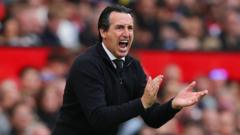Did Mikel Arteta Just Defend Martin Odegaard's Captaincy Against Arsenal Legend?

Understanding the Role of Leadership in Football: Martin Ødegaard's Captaincy at Arsenal
In the high-stakes world of professional football, leadership is paramount. It can make or break a team, especially in a competitive league like the Premier League. One of the most talked-about topics in recent times has been the captaincy of Martin Ødegaard at Arsenal. His leadership has been challenged by some former players, and the debate around whether he should retain the armband has intensified. This article will delve into the implications of leadership in football, Ødegaard's performance as captain, and the opinions of key figures surrounding this topic.
The Importance of Leadership in Football
Leadership in football encompasses much more than just wearing an armband. A captain is expected to inspire teammates, communicate effectively, and lead by example on and off the pitch. Captains often serve as the bridge between the coaching staff and players, translating tactical instructions into actionable strategies. Strong leadership can rally a team during challenging moments, fostering resilience and unity.
- Inspiration: A captain must motivate teammates to perform at their best.
- Communication: Clear communication helps in executing game plans effectively.
- Example: Leading by example sets the tone for the team's culture.
- Resilience: A captain must guide the team through adversity.
Martin Ødegaard: A Captain's Journey
Martin Ødegaard has been at the helm of Arsenal's captaincy for the past three seasons. His journey as a player has been remarkable, demonstrating exceptional skill and vision on the field. However, his leadership has come under scrutiny, especially following a season where he registered only 11 goal contributions in the league. Critics argue that this reduced output affects his ability to lead effectively.
Despite the criticisms, Ødegaard has managed to guide Arsenal to three successive runners-up finishes in the Premier League. His ability to maintain a positive atmosphere within the squad has been noted by his teammates and management. According to Arsenal manager Mikel Arteta, the squad’s faith in Ødegaard remains strong, as he revealed that players voted overwhelmingly for him to retain his captaincy.
Criticism from Former Players
Former Arsenal captain Tony Adams has sparked debate regarding Ødegaard's suitability as captain. Adams suggested that Declan Rice should take over the armband, arguing that a captain must reflect the club's ambitions and be a decisive leader. He emphasized the need for a winning mentality and criticized the current captaincy approach, claiming that Arsenal needs a figure who can elevate the team to new heights.
Adams' perspective resonates with many fans and pundits who believe that a captain must exhibit strong leadership qualities. However, it's essential to consider that every player has a unique style of leadership, and Ødegaard’s quiet, yet motivating demeanor may suit the current squad's dynamics.
Support for Ødegaard from Within the Club
In contrast to Adams' criticism, figures like former Arsenal goalkeeper David Seaman have expressed their unwavering support for Ødegaard. Seaman believes that changing the captaincy could disrupt the squad's harmony, especially during a critical period in the season. He argues that Ødegaard's qualities as a leader are evident and that he is already fulfilling the role with grace.
This dichotomy in opinions highlights the complexities of leadership in football. While some advocate for a more assertive captaincy style, others recognize the value of a captain who fosters unity and camaraderie. The challenge for Arteta lies in balancing these perspectives while maintaining team morale.
Arteta's Leadership Philosophy
Mikel Arteta’s approach to leadership emphasizes collective responsibility and teamwork. His belief in Ødegaard as captain reflects a philosophy that values collaboration over individual accolades. Arteta’s insistence on the players' vote for captaincy underscores his commitment to fostering a democratic atmosphere within the squad. This approach can cultivate a sense of ownership among players, further enhancing team dynamics.
Arteta’s leadership style has also been shaped by his experiences under managers like Pep Guardiola, where collective effort is prioritized. This perspective resonates with many in the modern game, where the emphasis on teamwork continues to grow.
Benefits of Consistent Leadership
Retaining Ødegaard as captain can provide several benefits to Arsenal. A stable leadership structure can contribute to a cohesive team environment, allowing players to focus on their roles without the uncertainty of frequent changes. Furthermore, maintaining continuity in leadership can enhance trust and communication within the squad.
- Increased Trust: Players are more likely to trust a consistent leader.
- Team Cohesion: Stability in leadership fosters a unified team culture.
- Focus on Performance: Players can concentrate on their game without distractions.
The Road Ahead for Arsenal
As Arsenal gears up for an intense Premier League season, the focus will be on developing a winning mentality. With Ødegaard at the helm, the team must rally together to overcome challenges and strive for success. The pressure will be on Arteta to cultivate an environment where players can thrive, fulfilling their potential under the guidance of a captain who embodies the club's values.
Moreover, the integration of new players like Martin Zubimendi and Leandro Trossard suggests a commitment to building a competitive squad. These additions can complement Ødegaard’s leadership, helping to elevate Arsenal's performance across all competitions.
Conclusion: The Future of Arsenal's Leadership
In conclusion, the debate surrounding Martin Ødegaard’s captaincy at Arsenal reflects broader themes of leadership and performance in football. While opinions vary, it is essential to recognize the value of stability and trust in a team environment. As the new season unfolds, the Gunners will look to harness their collective strengths and pursue their ambitions under Ødegaard's captaincy. The real test will be whether this leadership can translate into tangible success on the pitch.
As Arsenal fans, how do you feel about the current captaincy? Do you believe Ødegaard is the right choice, or is it time for a change? Share your thoughts and let’s discuss the future of leadership at Arsenal. #Arsenal #FootballLeadership #MartinOdegaard
FAQs
What qualities make a good football captain?
A good football captain should possess strong leadership skills, effective communication, the ability to motivate teammates, and lead by example both on and off the pitch.
Why is Martin Ødegaard considered a suitable captain for Arsenal?
Martin Ødegaard has shown the ability to inspire his teammates, maintain a positive atmosphere, and lead Arsenal through challenging matches. His experience and skills make him a valuable captain.
How can changing a captain affect a football team?
Changing a captain can disrupt team dynamics, affect player morale, and create uncertainty within the squad. Stability in leadership is often crucial for maintaining a cohesive team environment.
Published: 2025-08-15 13:22:17 | Category: Football



